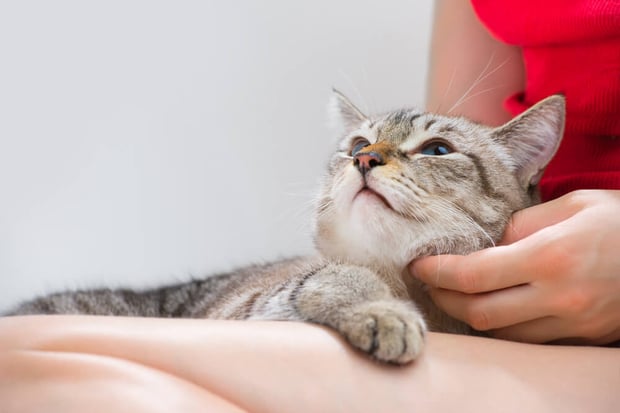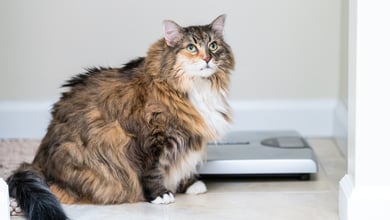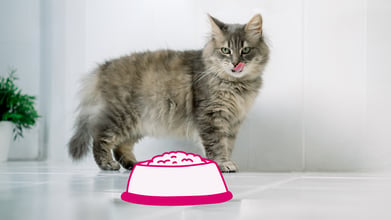How to Take Care of a Cat: 7 Vet-Recommended Tips

Table of Contents
There's nothing more exciting than bringing a new kitten home, but it's essential to know how to take care of your feline friend to ensure they live a long and healthy life filled with memorable moments. Cat care involves providing security, comfort, and love, which includes proper nutrition, clean water, a comfortable sleeping place, and regular grooming
Never Miss Your Pet’s Wellness Exam
No need to hassle with carriers and car rides to the vet. We will bring the clinic to you.
Here are seven important things to know before getting a cat to meet all their needs:
1. Proper Feeding and Hydration
Just like humans and other animals, cats need a balanced diet and constant access to fresh water. Proper feeding and hydration help prevent many health issues. So when you think about how to take care of a cat, their diet should come high on the list.
A cat's natural diet includes prey, such as rodents, birds, insects, and lizards, which provide high protein, minimal carbohydrates, and low fat. Cats are obligate carnivores and require taurine, which is found in animal-based proteins. Taurine deficiency causes serious health problems.
Provide a constant supply of fresh water, even if you rarely see your cat drink, and keep treats to no more than 5% of their diet.
If your cat isn't eating or you're not sure they're eating enough (or too much), schedule a veterinary visit so a qualified veterinarian can evaluate your cat and recommend an appropriate diet for your feline friend.
How Much Should I Feed My Pet?
View Results
How Much Should I Feed My Pet?
For guidance on your pet’s nutrition and optimal weight, schedule a home or virtual vet visit.
For guidance on your pet’s nutrition and optimal weight, schedule a home or virtual vet visit.

Share Quiz
2. Regular Grooming
Although cats groom themselves, they need extra help to keep them healthy. Essential grooming tips include brushing hair, bathing, trimming nails, dental care, and removing ear wax.
Grooming your cat helps:
- Reach parts a cat can't reach
- Remove loose fur, especially while shedding
- Help long-haired cats keep cool in warmer months
- Discover issues such as wounds, irritations, or fleas early
- Bond with your cat
3. Proper Housing
Your cat needs a clean, comfortable place to rest and sleep. Create a safe hiding space in a corner or closet where they can rest and sleep uninterrupted. Cats love elevated spaces, so providing shelves or cat trees is a good environmental enrichment that'll give them security and a great vantage point.
Cats love clean spaces, so clean their bedding and sleeping areas regularly and ensure the sleeping area is far from the litter box to maintain hygiene and reduce odors.
Many cats love roaming outside, but this exposes them to health risks, including ticks and fleas. It also raises the risk of ingesting toxic plants, chemicals, or poisons, among many other hazards.
4. Litter Box Maintenance
One of the most important parts of how to take care of a cat is the litter box. Cats are naturally clean animals and prefer to bury their waste. Keep the litter box clean in an accessible, quiet, low-traffic area for litter box training and post-training to promote good litter box habits. Your feline friend will avoid a dirty litter box and opt to eliminate waste elsewhere.
Top cat care tips: If you have multiple cats, provide one litter box per cat plus one extra. So, if you have two cats, you'll need three litter boxes. If you have three cats, you'll need four litter boxes.
5. Scratching Needs
Scratching helps cats maintain their claws, stretch muscles, and flex their joints. It's normal, healthy behavior, and cats don't sink their claws into your sofa to annoy you.
Providing your cat with a sturdy scratching post or a scratching board or pad will prevent them from ruining your furniture or carpets. They're inexpensive, depending on the type, and you can even make your own from scrap wood and natural fiber rope or corrugated cardboard.
6. Spaying and Neutering
It's important to spay or neuter your cat to prevent unwanted kittens and protect them from serious reproductive diseases, uterine infections, and cancers. It also reduces unwanted behaviors, such as male cats "spraying" and female cats in heat yowling.
You can arrange for these procedures during your kitten's first preventive care visit. Be sure to use a cat carrier when taking them to the veterinary clinic.
7. Maintaining a Healthy Weight
Domestic cats need portion control and regular exercise to avoid becoming overweight. An obese cat can develop health problems, such as diabetes, joint issues, and heart disease. When you provide a high-quality diet and ensure regular exercise, your furry friend will maintain a healthy weight.
Playing regularly with your cat helps prevent weight gain, supports proper muscle tone, keeps joints agile, boosts energy levels, enhances mental alertness, and promotes overall well-being.
Conclusion
If you have adopted a new kitten or cat or wish to improve the well-being of your adult cat, strive to provide a healthy, clean, and safe environment for your feline friend.
We hope the cat care tips we've provided will help you take good care of your cat. With good nutrition, regular health monitoring, socialization, and playtime, your cat will be happy and healthy. Consult a veterinarian if you have any concerns about your cat's health.
Frequently Asked Questions
Are cats easy to take care of?
Yes, caring for cats can be easy. In general, cats require regular feeding, access to fresh water, and litter box maintenance. Security, comfort, and love are the foundation of cat care.
How often should I feed my cat, and what should I feed them?
Adult cats generally do well with one or two meals per day. It's best to feed them high-quality cat food that meets their nutritional requirements. Wet cat food contains more water, which helps keep them hydrated, while dry kibble can help with dental health.
How can I ensure my cat stays hydrated?
Your cat should have access to fresh, clean water at all times. A cat water fountain will entice your feline to drink more. Wet (canned) cat food also helps them stay hydrated.
What are the recommended vaccinations and preventive treatments for cats?
Veterinarians highly recommend the FVRCP vaccine and rabies vaccines are required by law in most states. Other preventive care includes flea treatments if needed, deworming, dental care, health monitoring, and microchipping.
How do I litter train my cat and maintain proper litter box hygiene?
Most cats instinctively use a litter box, but proper litter training is essential, especially for kittens. Training includes calmly placing the cat or kitten in the litter box periodically and offering plenty of praise and a treat when their duty is done. Keep the box clean by scooping waste daily and doing a complete litter change every two weeks or so.







